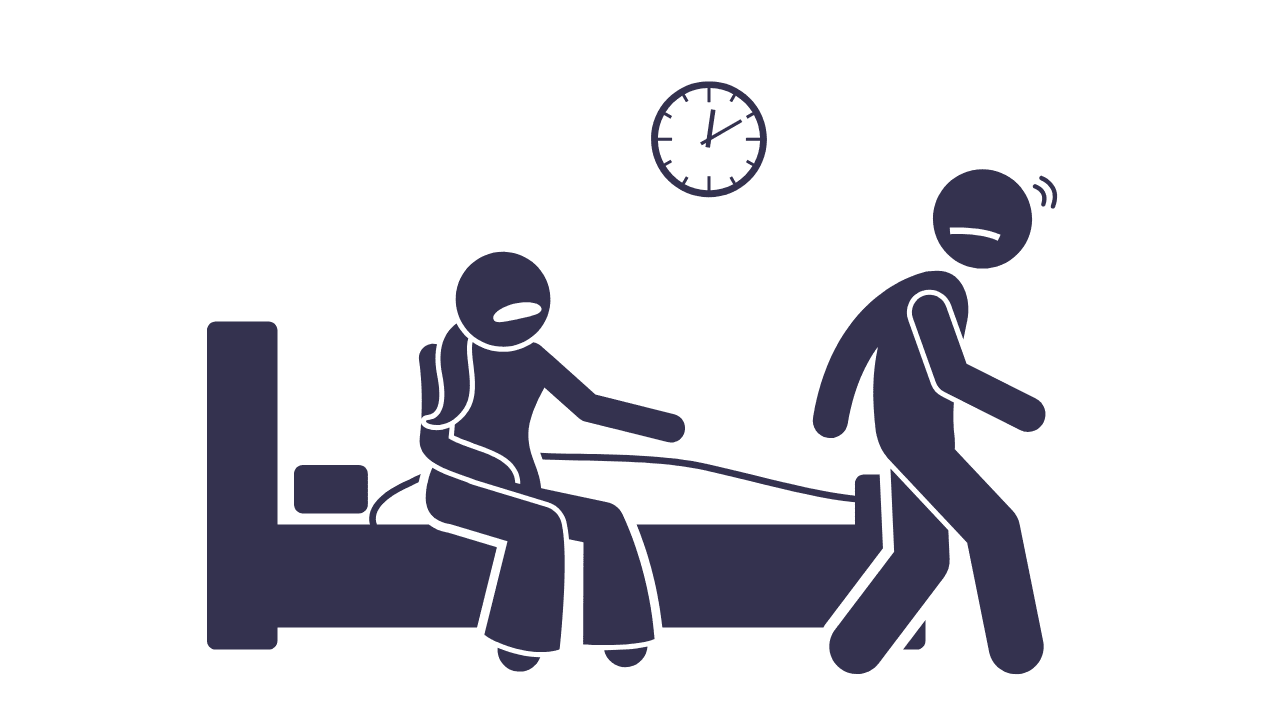Sexless Marriage Counseling
Many couples struggle with their sex life, and sometimes, a marriage can become nearly sexless. If you’re in a marriage without sex, you can get help with sexless marriage counseling.
A marriage without sexual intimacy is a common concern that can lead to feelings of frustration and a lack of intimacy. It can be a dark place in your relationship, making you wonder if your connection can ever be rekindled.
The good news is that there’s hope, and professional support is available. Sexless marriage counseling offers a path to understanding the causes of a sexless relationship and finding strategies to improve your sexual bond and rational closeness.
This post will explore how marriage counseling and sex therapy can help you navigate these difficulties, address the problem of no sex, and work towards a more fulfilling and connected relationship.

Content Writer and Editor
Table of Contents
Sexless Marriage Definition
A sexless marriage is a marriage where partners have little to no sexual engagement. While there’s no official definition, it’s often considered a marriage where couples have sex less than once a month or fewer than 10 times a year.
This isn’t just about a lack of physical connection, but a feeling of disconnect that can affect every aspect of your relationship.
It’s a condition that can impact a couple at any point in their relationship, whether it’s an issue from the very start of the marriage or something that develops over time.
The reasons can be emotional, physical, or a combination of both. Ultimately, a marriage without sex becomes a problem when one or both partners are unhappy with the situation.
Who is a Sexless Marriage Counselor?
A sexless marriage counselor is often a licensed marriage and family therapist or a sex therapist who specializes in helping couples navigate challenges related to emotional connection and their sex life.
While any advisor or couples relationship expert can help with general relationship issues, a sex coach has specific training to address the complex psychological and physiological factors that contribute to a marriage without sexual intercourse.
They create a safe and non-judgmental space where both partners can openly discuss the lack of affectionate touch and work through difficult feelings.
Their goal is to help couples improve communication, rebuild an effective bond, and develop strategies to address the root causes of their sexual disconnect, whether that’s due to stress, health issues, or past experiences.
Sexless Marriage Advice for Men
For many men in a marriage without sexual intimacy, it’s easy to feel rejected, frustrated, and alone. When you’re the one with a stronger sexual desire, it can feel like a personal blow to your masculinity and confidence.
The first step is to recognize that this isn’t necessarily a reflection on you or your worth. No sex often stems from deeper issues that have nothing to do with your attractiveness or how much your partner loves you.

Here are some tips to help men who are in a marriage without sexual activity:
- Communicate without blaming: When you talk to your partner, focus on your own feelings (“I feel disconnected”) rather than placing blame (“You never want to have sex”). This makes the conversation less confrontational and more productive.
- Explore non-sexual intimacy: Rekindle physical connection in other ways, like grasping hands, cuddling on the couch, or giving back massages. These small gestures can rebuild intimacy and bond without the pressure of sexual relations.
- Consider a couples specialist or relationship coach: A professional can provide a neutral space and give you tools to communicate effectively. They can help you get to the root of the problem and teach you strategies for getting your sex life back on track, if that’s what you both want.
- Look inward: Reflect on your own behaviors. Are you contributing to the distance? Sometimes, factors like stress, poor communication, or even a lack of emotional support can impact your partner’s sexual desire.
- Manage expectations: Acknowledge that getting your sex life back may not happen overnight. It’s a process that requires patience, understanding, and consistent effort from both partners.
Sexless Marriage Advice for Women
It’s common for women in a celibate marriage to feel a mix of emotions, from guilt and inadequacy to frustration and resentment.
You may be dealing with a lower libido due to stress, hormones, or simply a lack of connection with your partner.
It’s important to remember that these feelings are valid, and it’s okay to not want sex if you don’t feel emotionally safe or connected. The focus of improving your sex life should be on rebuilding emotional intimacy first.
Here are some tips to help women who are in a marriage without sexual activity:
- Address the “elephant in the room:” Avoiding the topic only makes things worse. Find a calm moment to bring up the issue with your partner. You could say something like, “I miss feeling close to you, and I want to talk about how we can get back to that place.”
- Focus on emotional intimacy: Affectionate touch is often a byproduct of a strong affective bond. Prioritize date nights, have deep conversations, and show affection in non-sexual ways, like hands holding or giving hugs.
- Identify the root cause: The sexual connection isn’t just about a lack of sexual desire. It could be tied to a previous encounter, stress, or resentment in the relationship. A professional therapist can help you uncover these deeper issues in a safe space.
- Consider a sex coach for yourself: If you’re not ready for couples therapy, you can start with individual therapy. A good relationship expert can help you understand your own feelings, work through any personal barriers, and give you tools to better communicate with your partner.
Sexless Marriage Counseling for a Frustrated Spouse
If you’re the partner who feels a greater sense of frustration or a stronger sexual need, a marriage with no sex intercourse can feel like you’re in a dark place in your relationship.
You might feel a deep loneliness, questioning if you’ll ever feel bonded to your partner again.
While it’s tempting to focus solely on the sex deficit, relationship counseling provides a way to get to the root of the issue and address the emotional pain you’re both experiencing.

Here’s how marriage without sex counseling can help a frustrated spouse:
- It provides a neutral ground: A professional consultant creates a safe space to have difficult conversations without them turning into arguments. You can finally start talking about sex and your feelings in a constructive way, making it easier to be heard and understood.
- You can work on your communication: A therapist will teach you and your partner new communication skills, so you can express your needs and desires without blame or criticism. This is crucial for both partners to feel united again.
- The focus is on the entire relationship. While you might be focused on the sexual estrangement, the counselor will help you see the bigger picture. They’ll work with you to improve emotional bond and overall relationship satisfaction, which often naturally leads to an improved intimate relationship.
- Individual therapy is also an option: If your partner isn’t ready to go to couples counseling, don’t give up. You can start with personal therapy to process your feelings, learn coping mechanisms, and figure out the best way to approach your partner. This is a powerful step toward reclaiming your well-being.
Marriage Without Sex Due to a Medical Condition
When a medical condition gets in the way of sex, it can put a real strain on a marriage.
You might be feeling frustrated, lonely, or even wondering if your partner is looking for sexual connection elsewhere, leading to worries about infidelity.
It’s completely understandable to feel this way. Sex is a huge part of a romantic relationship, and when it’s off the table, the feeling of intimacy can fade.
Here are some medical conditions that can cause a decline in sex in a marriage:
- Hormonal Imbalances: Conditions like low testosterone in men or low estrogen in women can significantly reduce libido and affect the ability to feel sexually attracted to a partner.
- Chronic Pain: Chronic illnesses such as fibromyalgia, arthritis, or back problems can make sexual intimacy painful or simply not enjoyable.
- Cardiovascular Disease: Heart conditions can lead to fatigue and fear of sexual engagement, as some people in marriages without sex worry that the physical exertion could be dangerous.
- Mental Health Conditions: Depression, anxiety, and stress can all lower sex drive and make it difficult to focus on intimacy with your partner. Therapy may be necessary to treat these conditions.
- Side Effects of Medication: Many common medications, including antidepressants, blood pressure drugs, and certain painkillers, can have a negative impact on sexual desire and function.
- Neurological Conditions: Diseases like multiple sclerosis or Parkinson’s can affect the nervous system’s ability to respond to sexual stimulation.
- Cancer and Its Treatment: Chemotherapy, radiation, and surgery can cause severe fatigue, pain, and body image issues that make it difficult to engage in sex.
- Diabetes: This condition can lead to nerve damage and blood flow issues that cause erectile dysfunction in men and reduced sensation in women.
A lot of couples in marriages without sexual intercourse struggle with a lack of arousal, orgasm, and sex drive. In this case, a medical specialist or a clinical sexologist is needed to determine and address the problem.
Marriage Without Sexual Intimacy Divorce Rate
It’s natural to wonder if a marriage without a sexual bond is a guaranteed path to divorce.
While there isn’t a single, definitive statistic that applies to every couple, a strong body of research shows a clear link between a lack of sexual and intimate bond and a higher risk of divorce.
For many couples in marriages without sex, the issue isn’t just about the absence of sex; it’s a symptom of deeper problems that can threaten the entire relationship.

A meta-analysis published on ResearchGate that reviewed over 20 studies found that sexual problems and dissatisfaction were consistently among the most significant factors cited in divorce.
While celibacy might not be the legal reason, it’s often the “emotional divorce” that happens first.
This suggests that sexual frequency isn’t the only factor; what’s more important is a shared sense of sexual satisfaction and a strong emotional bonding.
Marriage Without Physical Intimacy Survival Rate
The idea that a marriage with no sex can survive might seem unlikely, but experts agree that it’s possible with some very important conditions.
A marriage without sexual affection can last, but it likely won’t thrive unless both partners are on the same page and are fulfilled in other areas.
The key to survival isn’t the absence of sex; it’s the presence of other forms of connection and the absence of frustration.
According to research from the Gottman Institute, a leading organization for relationship research, it’s not the frequency of sex that predicts a marriage’s success, but the overall quality of the couple’s friendship and emotional bond.
A study by the Gottmans found that couples who maintain a strong friendship and a healthy intimate life are far more likely to stay together and be happy.
This highlights the importance of emotional connection and a mutual understanding of what “intimacy” means for each partner.
Final Thoughts About Sexless Marriage Counseling
The most important takeaway is this: you’re not alone in this struggle. Many couples in marriages without sexual relations feel lost, but with the right guidance, you can find your way back to each other.
It’s easy to assume that a lack of interest in sex means there’s no hope, but a sex therapist can help you redefine what sex and intimacy mean for your unique relationship.
They can help you explore why you and your partner aren’t interested in sex and work on building emotional and physical connection in new ways. Therapy isn’t about forcing you to engage in sexual relations if you don’t want to.
The goal is to reconnect and build the kind of affection with your partner that is an essential aspect of a relationship. Don’t let the fear of a difficult conversation stop you.
Many married couples who were on the brink of giving up have found that online couples consultation or traditional therapy has been the key to an improved sex life and a stronger bond.
You can learn how to work with couples to find a new path forward and rediscover what a truly connected relationship can be.
FAQs About Sexless Marriage Counseling
Coping with a marriage without sexual relations can be emotionally draining. It's crucial to first acknowledge your feelings of frustration or sadness. Focus on rebuilding emotional bond and closeness in non-sexual ways, such as hugging, holding hands, or simply spending quality time together. Finding hobbies you both enjoy and expressing affection verbally can help you feel connected. If your feelings of sadness persist, a professional counselor can provide tools for coping and a space to work through your emotions.
Yes, absolutely. Therapy can be incredibly effective for couples in a celibate marriage. A sex therapist or couples coach can help in addressing the core of the problem, which often isn't just about the physical act. They can address issues like communication breakdowns, resentment, or differing libidos. With a professional's guidance, numerous couples learn to reconnect emotionally and find ways to address the lack of sex in a healthy and productive way.
Sexless marriage psychology looks at the mental and emotional factors behind why a couple's romantic life has stopped. It explores issues like unresolved anger, stress, anxiety, body image issues, or even past experiences that might be affecting one or both partners. It also considers how emotional distance or a lack of emotional connection can lead to a lack of physical desire. Essentially, it's about understanding the "why" behind the physical disconnect to find a lasting solution.
Dealing with a sex deficit starts with a commitment from both partners to rebuild it. Try scheduling regular date nights, even if they're at home, to prioritize quality time. Engage in shared hobbies, practice active listening, and offer more physical affection like cuddling and holding hands. If these steps don’t work, seeking counseling is a great way to learn new tools and strategies to bring back that emotional and physical connection and improve your overall relationship satisfaction.
